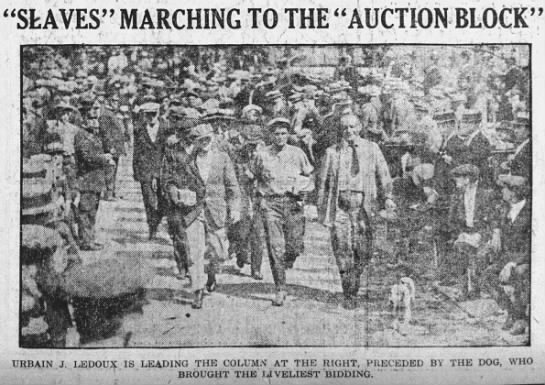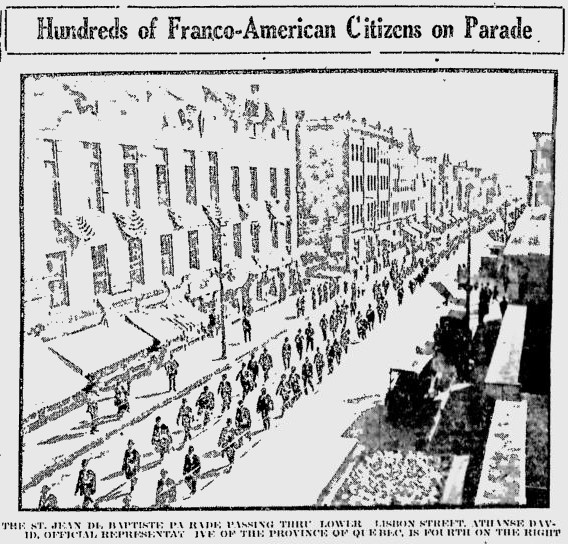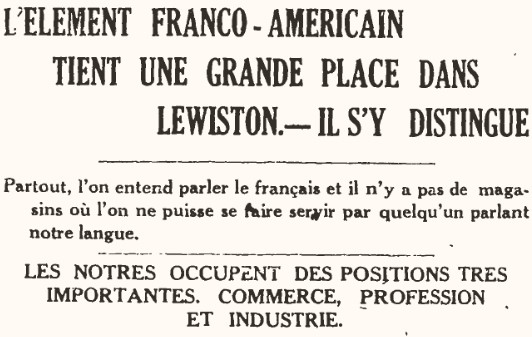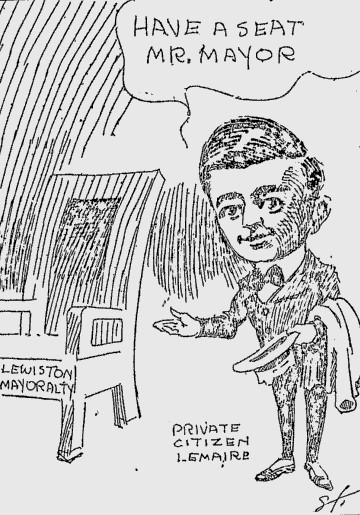Franco-Americans—and a larger community of French Canadians—were visible in 1921. This is the third part of a year-long tour of major stories concerning Quebec and its diaspora. See the second installment here.
September
Biddeford’s French-language newspaper runs a profile of a now-forgotten Franco-American known as “Mr. Zero.” The nickname belongs to a Mainer named Urbain Ledoux, who served in political offices in the 1890s and then in consular positions abroad—including one in Trois-Rivières, Quebec. After struggling in business, at the end of the First World War, he became a social worker. The postwar inflationary cycle collapsed, provoking a deep and hard-felt recession that spanned the country. Shaken by the suffering he witnessed in New York City, Ledoux engaged in charitable work, organized soup kitchens, and sought to connect unemployed workers with jobs. He earned his nickname for his self-effacing approach when helping those in need, but he was not above high-profile stunts to bring politicians’ attention to the economic crisis.
On September 8, 1921, Ledoux holds a human auction on Boston Common to highlight not only widespread suffering, but men’s willingness to work. He meets with President Harding at the White House at the end of the month, though little seems to come of the event. Throughout his professional life, this Franco-American regularly visits his hometown of Biddeford and vacations in Old Orchard.
See La Justice de Biddeford, September 2, 1921. See also Michael Guignard’s short biography, “‘Mr. Zero’ of Maine: The Story of Urbain Ledoux,” Le Forum, winter 2017.

October
Lewiston hosts the tenth congress of the Union Saint-Jean-Baptiste, the influential mutual benefit association. In his remarks at the opening mass, the Dominican Ange-Emile Dion celebrates the society’s “strictly Catholic and national” endeavors, with special emphasis on its ability to unite dispersed Franco-American communities. Athanase David, the Liberal MLA for Terrebonne, is present as the official representative of the Province of Quebec. He highlights the shared values of French Canadians north and south, particularly their commitment to social order amid the many disruptions of the postwar world. The conservative inclinations of the USJB are made plain when members vote on whether to admit women as delegates. Led by Secretary General Elie Vezina, attendees reject the proposal.
Emery San Souci, a native of Saco and the second Franco-American governor of Rhode Island, addresses the congress at city hall; he spoke to a group of Republican women voters in Auburn the day before. San Souci responds to Henri Ledoux’s introduction in French but quickly switches to English. He explains that he grew up in an English environment, his mother being his only link to the French language. He then shares his Horatio Alger-esque story:
At the age of 11, I was a messenger in the Laconia Mills in Biddeford. By that time I had received the last schooling I have ever had. Since that time I have received my education in the college of hard knocks. Now, I return to Maine! Forty five years after leaving this State as a mill employe[e] I am returning to meet men of my own blood as the chief executive of the sovereign state of Rhode Island, elected to that office by the largest majority ever given there. At the last election I carried every town and city in the state . . . Opportunity offers itself to those of humble beginning nowhere as in the United States. The matter of race does not enter into it, because people are broad-minded. It is the man who has lived a ‘straight’ life, no matter what race he may be, who wins.
The governor encourages Franco-Americans to become citizens and to learn English, which they may do without sacrificing French. Parents, he adds, should provide every possible educational opportunity to their children.
See La Justice de Biddeford, October 7, 11, and 14; Lewiston Evening Journal, October 12 and 13.


November
Move over, La Fayette. In the fall of 1921, another French commander tours the eastern United States and receives state honors and a hero’s welcome from enormous crowds. Marshal Ferdinand Foch, the former supreme Allied commander, visits numerous states and finally reaches the French-Canadian centers of Rhode Island and Massachusetts. Bishop William Hickey receives Foch at the Cathedral of Saints Peter and Paul in Providence. The marshal then boards a chartered train that makes a brief stop in Pawtucket, “where a mass of frantic, cheering humanity had gathered.” That still does not compare to the enthusiastic welcome he receives later in the day in Woonsocket. After official words of introduction from former governor Aram Pothier and mayor Adélard Soucy, to the throngs assembled near the city, Foch states, in French,
When I am in Woonsocket, I feel that I am in France! I’m glad to be in Woonsocket, with people of French descent, people of my own blood. This greeting stirs me deeply. If through any efforts of mine the war was made to end as it did, then it was because of the unity of peoples and the unity of Nationalities.
Having claimed La Fayette as a representative of their “race” and as symbol of French-American unity for generations, French Canadians in the United States can now assert their patriotism through their service in the First World War and the renewal of the French alliance.
See Boston Globe, November 14, 1921; La Tribune [Sherbrooke, Quebec], November 21, 1921.
December
The Boston Globe publishes a profile of Rhode Island congressman Ambrose Kennedy, the son of Irish immigrants now mentioned as a potential candidate for the governor’s office. The short biography emphasizes Kennedy’s connection to French-Canadian culture, which has undoubtedly helped him in the Ocean State. He became fluent in French from two years of college education in Saint-Hyacinthe, Quebec. Kennedy then studied at Holy Cross College and earned a law degree from Boston College. He settled in Woonsocket, where he participated in all of the major French-Canadian events. From the state house he “graduated” to Congress.
As of 1921, thanks to his reliable political base, he has yet to be defeated for public office. (Kennedy would decline renomination in 1922; Pawtucket’s Louis Monast, a native of Marieville, Quebec, would hold the seat later in the decade.)

Other prominent Franco-American officeholders in 1921 include Edouard Simoneau and Joseph M. Grisé, mayors of Marlboro and Chicopee, Massachusetts, respectively; and Moïse Verrette and Henri Burque, mayors of New Hampshire’s largest cities. Charles Lemaire, chief executive of Lewiston, Maine, leaves his office in March. Edmond Talbot would become mayor of Fall River, Massachusetts, in 1922.
See Boston Globe, December 29, 1921. Check out “Tout nous serait possible”: Une histoire politique des Franco-Américains, 1874-1945 for more on Franco-Americans’ political involvement in this period.
Leave a Reply